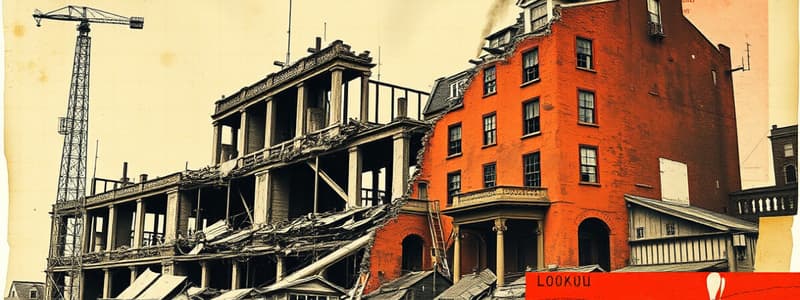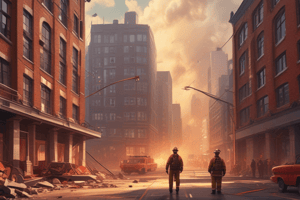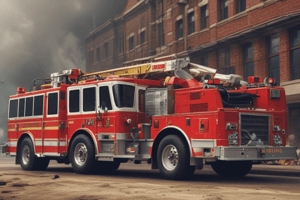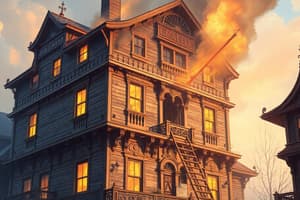Podcast
Questions and Answers
Which of the following factors does NOT contribute to the risk of structural collapse in buildings during a fire?
Which of the following factors does NOT contribute to the risk of structural collapse in buildings during a fire?
- Cantilevered canopies
- Open areas in the building design
- Buildings with heavy truss roofs
- Reinforced concrete walls (correct)
What is a key responsibility of Command during firefighting operations in buildings at risk of collapse?
What is a key responsibility of Command during firefighting operations in buildings at risk of collapse?
- To ignore feedback from Company Officers
- To continuously evaluate the potential for structural failure (correct)
- To ensure all firefighting personnel are inside the building
- To maintain offensive strategies regardless of conditions
Which scenario requires Command to be fully prepared to withdraw interior crews from a fire scene?
Which scenario requires Command to be fully prepared to withdraw interior crews from a fire scene?
- Company Officers report minor smoke exposure
- Structural inspections indicate no safety concerns
- The fire has been brought under control
- Heavy fire conditions persist for 10-15 minutes (correct)
What action should be taken if a building's structural failure is deemed likely during firefighting efforts?
What action should be taken if a building's structural failure is deemed likely during firefighting efforts?
Buildings supported by what type of structures are particularly at risk of collapse during a fire?
Buildings supported by what type of structures are particularly at risk of collapse during a fire?
Which structural component is most likely to fail in a fire-involved building?
Which structural component is most likely to fail in a fire-involved building?
What is a common sign of imminent structural collapse?
What is a common sign of imminent structural collapse?
Which type of construction is expected to fail the quickest when exposed to fire?
Which type of construction is expected to fail the quickest when exposed to fire?
In multi-story buildings, which section is particularly vulnerable to collapse due to fire exposure?
In multi-story buildings, which section is particularly vulnerable to collapse due to fire exposure?
What effect can a peak or dome-shaped roof have during a collapse?
What effect can a peak or dome-shaped roof have during a collapse?
What external condition can indicate an increased risk of structural failure?
What external condition can indicate an increased risk of structural failure?
Which of the following is a potential indicator of structural instability?
Which of the following is a potential indicator of structural instability?
Which condition is least likely to be a sign of building collapse?
Which condition is least likely to be a sign of building collapse?
Flashcards are hidden until you start studying
Study Notes
Structural Collapse Overview
- Structural collapse poses a significant risk of injury and death to firefighters during operations.
- Incident action plans must prioritize the potential for structural collapse in firefighting strategies.
Key Factors Leading to Collapse
- Intense fire exposure will inevitably lead to structural failure if allowed to affect a building for an extended period.
- The age and exterior of a building do not determine its structural integrity under fire conditions.
Vulnerable Areas
- Roof structures are highly susceptible to collapse, which can lead to the failure of adjoining walls, especially in peaked or dome-shaped roofs.
- In multi-story buildings or those with basements, the floor above a fire may collapse if heat directly impacts supporting members.
Building Construction Types
- Understanding different construction types is crucial for assessing collapse risk.
- Lightweight truss and bar joist roofs are particularly prone to failure with minimal fire exposure.
Warning Signs of Collapse
- Look for cracks and bulges in exterior walls.
- Listen for structural noises such as creaking or groaning.
- Check for smoke or water leaking through walls and water accumulation on roofs.
- Identify if windows, doors, floors, or stairs are out of level.
- Observe flexible movement in floors or roofs while operating.
- Assess leaning, twisting, or flexing of interior or exterior walls and columns.
- Note sagging or distorted rooflines and the duration of fire involvement.
Contributing Structural Features
- Be aware of conditions that can accelerate structural failure:
- Parapet walls and large unsupported open areas.
- Large signs or marquees that may detach from weakened walls.
- Cantilevered canopies relying on roof integrity.
- Light weight trusses, bar joists, or bowstring truss roofs.
- Buildings with unprotected metal beams or columns.
- Construction sites that are incomplete or undergoing renovations.
Evaluation and Operational Strategies
- Continuous evaluation of buildings with risk factors is essential for determining offensive or defensive tactics.
- Command responsibility includes assessing the building's tenability for interior firefighting operations.
- Input from Company Officers and Sector Officers is vital for ongoing structural evaluations.
Strategic Changes and Safety Protocols
- If heavy fire conditions persist for 10-15 minutes, a reevaluation of structural conditions is necessary, leading to potential withdrawal of interior crews.
- Establish a No-Entry Zone at a safe distance if structural failure is imminent, ensuring all personnel remain outside this perimeter.
Studying That Suits You
Use AI to generate personalized quizzes and flashcards to suit your learning preferences.




